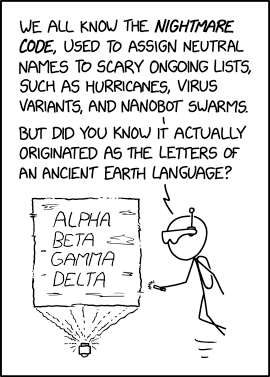Sirwalterraleigh
Premium Member
I just saw the disparity in vaccinations by state map.
it’s pathetic. Laughable.
have a good day
it’s pathetic. Laughable.
have a good day
The sick reaction is far less common with the first shot, but it does occur often enough that it's worth a warning.Thanks for the puppy pictures!
Have there been many people who need to miss work the day after the first shot of an mRNA vaccine? Everybody who I know that had anything more than a sore arm, the other symptoms were all after shot #2.
This is the type of info that should be put on billboards. Maybe that would finally get the unvaccinated to have it sink in how much lower thier risk would be if they got vaccinated. Over 95% of deaths from roughly half the population.Dr. Pino also gives some raw numbers from February 6th through June 22 -
There were 185 deaths - out of those, 177 were unvaccinated.
There were 530 hospitalizations - out of those, 506 were unvaccinated.
Is there a consensus on when/if the restrictions will be re implemented at WDW? I have a trip planned in August and November. And I'm hoping for both to be mask free. The rising case #'s make me wonder if things will change/revert back.
That would be a problem in Florida.Based on the actions of those in charge in Florida, I would find this extremely unlikely.
My personal guess is, if cases really spike the most you'd see is a vaccine requirement to enter the parks.
From what I understand after reading about cruises, they can ask for proof of vaccine, but cannot deny entry without it. If one does not have it, they can distinguish and require masks. I think Celebrity was doing special wrist bands for vaccinated so they had access to vaccinated only areas too.That would be a problem in Florida.
Maybe, but the poster was specifically asking about WDW and the person answering mentioned a vaccination requirement to enter the parks.From what I understand after reading about cruises, they can ask for proof of vaccine, but cannot deny entry without it. If one does not have it, they can distinguish and require masks. I think a celebrity was doing special wrist bands for vaccinated so they had access to vaccinated only areas too.
I think so. You might see more "recommendations" if cases continue to rise, but I highly doubt they revert back.Showing a vaccine card would not be an issue. We're all vaccinated. So y'all think things will stay pretty much like they are now (back to normal) for the foreseeable future?
In Florida, unless there is a strain that renders the vaccines much less effective, the chance of any restrictions returning is about the chance of a 5th gate opening next year.I think so. You might see more "recommendations" if cases continue to rise, but I highly doubt they revert back.
Which is exactly why I said "recommendations".In Florida, unless there is a strain that renders the vaccines much less effective, the chance of any restrictions returning is about the chance of a 5th gate opening next year.
I made sure to schedule my 2nd Moderna shot for a Friday evening, since I don't work weekends, just in case. And I'm glad I did! My first shot was fine--sore arm and slight headache. But on the afternoon after my 2nd one, I got hit with the full side-effects package: nausea, chills, and a fever of 103 degrees! Temp finally went down to a manageable 100 later that night, and by the next morning it was normal, though I still felt lethargic and kind of icky all day. And to my knowledge I have not had covid. The general consensus among the friends and other people I talked to was that the 2nd dose made almost all of them feel sick to some degree, though not as sick as I was. (Except for my brother and his girlfriend; they didn't have any negative reactions at all) But the effects were generally short-lived, and we're all glad to have gotten fully-vaccinated!Thanks for the puppy pictures!
Have there been many people who need to miss work the day after the first shot of an mRNA vaccine? Everybody who I know that had anything more than a sore arm, the other symptoms were all after shot #2.
The poor Greeks. What did they do to have the world use their alphabet?Insane media coverage of Delta is about to turn to Lambda. No idea what they will do once they surpass Zeta.
The only lambda I care about:The poor Greeks. What did they do to have the world use their alphabet?Too bad they didn’t decided to use the Hawaiian alphabet or we’d be almost done with Covid mutations

The poor Greeks. What did they do to have the world use their alphabet?Too bad they didn’t decided to use the Hawaiian alphabet or we’d be almost done with Covid mutations


I read that Black Mesa *caused* the virus!The only lambda I care about:
View attachment 570263
Black Mesa would know how to handle this virus.
Register on WDWMAGIC. This sidebar will go away, and you'll see fewer ads.
